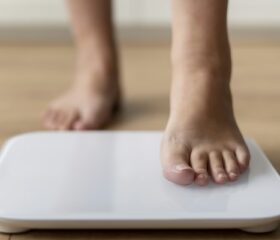Postpartum Weight Loss: Timeline, Diet, and Tips
One of the top concerns for many new moms is when they’ll finally shed their “baby weight” from pregnancy. However, you should be realistic about your weight loss goals after having a baby.

- How much weight is it normal to gain during pregnancy?
- When will you lose your pregnancy weight?
- 7 healthy habits for postpartum weight loss
- What to avoid for healthy postpartum weight loss
- When to speak to your doctor about postpartum weight loss
- What other moms on Glow say about their postpartum weight loss
- Final thoughts
While it’s important to return to a healthy weight after giving birth, especially if you plan on getting pregnant again in the future, your body needs time to recover and heal.
Read on to learn what normal postpartum weight loss looks like, tips for leading a healthy lifestyle after giving birth, and when you can expect to get back to your pre-pregnancy weight.
How much weight is it normal to gain during pregnancy?
When you’re pregnant, you’ll naturally gain about 24 to 30 pounds. 1
You can expect your baby to account for about 7.5 pounds of your total pregnancy weight gain. Here’s a breakdown of where the rest of that weight comes from: 2
| Body part | Average weight gain in pregnancy |
|---|---|
| Placenta | 1.5 pounds |
| Amniotic sac | 2 pounds |
| Uterus | 2 pounds |
| Breast tissue | 2 pounds |
| Blood volume | 4 pounds |
| Fluids in maternal tissue | 4 pounds |
| Maternal fat stores | 7 pounds |
This all adds up to about 30 lb in total (including your baby’s weight). This is just a rough guideline, and your pre-pregnancy BMI will also affect how much weight you’ll put on when you’re pregnant, as well as how much you’ll lose afterward.
When will you lose your pregnancy weight?
If you’re eager to shed your baby weight as quickly as possible, here’s a piece of good news: most new moms lose about 11–13 pounds right after they give birth. This is accounted for by your baby, placenta, and amniotic fluid. 1
Within 2–3 weeks of giving birth, you should also lose the extra fluid you retained during pregnancy.
After that initial drop, weight loss tends to slow down. Most women can safely lose about 1 lb per week and tend to lose about half of their baby weight by 6 weeks. 3
Generally, you can expect to return to your pre-pregnancy weight within 6–12 months. 4
However, every mom’s weight loss timeline is unique. How quickly you lose your baby weight will depend on factors such as:
- Your metabolism
- Your diet
- Your activity level
- How much weight you gained during pregnancy
- Whether you’re breastfeeding your baby
Instead of trying to lose weight as quickly as possible, focus on gradually but steadily shedding those extra pregnancy pounds. As with many aspects of your health, this is a marathon, not a sprint.
7 healthy habits for postpartum weight loss
To reiterate, your top priority should be to adopt healthy habits for the long term. Here are seven lifestyle changes you can make to ensure you lose your pregnancy weight at a healthy rate:
1. Set realistic goals and be patient
Despite what you might see on social media, postpartum weight loss takes time. After everything your body went through during pregnancy, you’ll need time to recover.
As such, you should be realistic with your weight loss goals. Most women can safely lose about 1 pound per week. You should avoid losing more than 2 pounds per week, as this can not only affect your own health, but could also decrease your milk supply (if you’re breastfeeding your baby).
2. Maintain a balanced diet
While your body recovers, be sure to fuel it with nutritious foods. If you’re breastfeeding, you’ll need an additional 450–500 calories per day to produce enough milk for your baby. 5
Fill your plate with whole, unprocessed foods that are full of nutrients, such as:
- Lean protein: Foods like chicken, fish, eggs, beans, and lentils help repair your body’s tissues, keep you feeling full, and can even boost your metabolism.
- High-fiber carbohydrates: Complex carbs from sources like fruits, vegetables, and whole grains (oats, brown rice, quinoa) provide sustained energy and aid in digestion. This also helps you feel full for longer.
- Healthy fats: Avocados, nuts, seeds, and olive oil are essential for brain health and nutrient absorption.
Make sure you have plenty of healthy snacks on hand for when you need an energy boost (which is bound to happen with a fussy, crying baby). Keep food on hand like Greek yogurt, cut vegetables with hummus, hard-boiled eggs, apples with nut butter, or almonds.
Should you take any nutritional supplements?
According to the Centers for Disease Control and Prevention (CDC), you might need vitamin supplements during the postpartum period if you’re breastfeeding, especially if you’re following a vegetarian or vegan diet. 6
Talk to your doctor about whether you should take any supplements, and if so, which ones.
Avoid calorie-restrictive diets during the postpartum period
Diets that restrict calories can deplete your energy, deprive you of essential nutrients, and reduce your milk supply. You should focus on eating a balanced postpartum diet and incorporating gentle exercise into your daily routine. Don’t start any weight-loss diets until your doctor gives you the all-clear. 1
3. Breastfeed your baby
One of the best ways to lose weight healthily is by breastfeeding your baby. Producing milk burns an extra 500–700 calories per day. 7
However, breastfeeding isn’t a magic bullet for weight loss. As mentioned, you’ll also need to add up to 700 additional calories per day to your breastfeeding diet, which will largely cancel out the extra calorie burn.
What’s most important is that your baby gets enough to eat. In the first few months postpartum, focus on giving your body the fuel it needs so that your milk is as nutritious as possible and your supply is adequate.
Breastfeeding is one part of a routine that will help you return to your ideal weight, but it will still take time.
4. Get moving
Along with following a healthy diet, you should also stay moderately active. Not only will this help you lose weight at a healthy pace, but it’ll naturally boost your mood and energy levels.
That said, here again, try not to overdo it. Your body needs time to heal after delivery, especially if you had a C-section or a complicated birth. Most doctors will clear you for gentle exercise at an early postpartum checkup (potentially as soon as 2 weeks after birth). Avoid starting any fitness routines until your doctor gives you the green light.
Once your doctor clears you, listen to your body and start slowly, aiming for around 150 minutes of moderate-intensity aerobic activity per week, which you can break down into smaller sessions.. Walking, swimming, dancing, or postnatal yoga are all good exercises to start with.
Don’t forget strength training
While cardio is excellent for burning calories, resistance training helps you rebuild muscle and boost your metabolism. Strong muscles burn more calories at rest, which aids in long-term weight management.
You don’t need a gym membership to get started. You can try out simple bodyweight exercises, like squats, lunges, and planks, at home.
As you get stronger, you can incorporate light weights or resistance bands. Aim to strengthen your core and pelvic floor, which became stretched and weakened during your pregnancy and childbirth.
5. Stay hydrated
Staying hydrated is important for everyone, but even more so for new moms. Water can boost your metabolism and help you feel full, reducing the temptation to overeat.
Notably, if you’re breastfeeding, you’ll need far more fluids to support your milk production. Keep a water bottle handy and sip throughout the day to stay on top of your needs.
6. Get enough sleep
It may seem like a cruel joke when you’re dealing with a crying infant, but it’s essential that you get enough sleep.
A lack of sleep can make it much harder for you to lose weight. When you’re sleep-deprived, your body produces more cortisol, a stress hormone that can lead to weight gain, particularly around the belly. 8
Try to get rest whenever you can, such as by taking short naps while your baby is sleeping. You can also ask your partner, family, or friends to help you out with the baby so you can get some much-needed sleep.
7. Manage your stress and ask for help
It’s no secret that caring for a newborn is demanding, and the stress of looking after your baby can work against your weight loss goals. When you’re stressed out, your body also releases cortisol, just like when you’re sleep-deprived.
Find ways to ease the burden of caring for your baby, such as:
- Asking for and accepting help: Again, don’t hesitate to lean on your partner, family, and friends. You can ask for help with meal prep, chores, or watching your baby so you can lighten your load.
- Connecting with others: Try to connect with other new parents, either in an online or in-person group. This will help you feel less alone, and you may even pick up a few useful tips from other parents in the same boat as you.
- Knowing when to seek professional help: Being a new parent is overwhelming, but if you feel persistently sad, anxious, or unable to cope, you could be experiencing postpartum depression or anxiety. If so, reach out to your doctor or a mental health professional to get the support you need.
What to avoid for healthy postpartum weight loss
While you may be aware of what foods you should include in your postpartum diet, you should also know what to avoid.
Certain foods and drinks can easily add empty calories and hinder your weight loss and overall health. Be sure to reduce or cut out:
- Added sugar and refined carbs: Foods high in added sugar and refined carbohydrates (like white bread, pastries, and sugary drinks) are high in calories but low in nutrients. They’ll cause your blood sugar to spike and crash, leaving you feeling tired and craving more unhealthy food.
- Highly processed foods: Fast food, pre-packaged meals, chips, and cookies are often loaded with unhealthy fats, sugar, sodium, and calories. Since they’re designed to be hyper-palatable, it’s easy to over-indulge.
- Excessive alcohol: Alcohol gives you empty calories without any nutritional benefit. Moreover, if you’re breastfeeding, the safest option is to avoid alcohol altogether, as it can pass into your breast milk. However, if you still plan on drinking occasionally, make sure to wait at least 2 hours after having one standard drink (e.g., a 5-oz glass of 12% wine) before breastfeeding your baby. 9
When to speak to your doctor about postpartum weight loss
During your first postpartum checkup at 3 weeks, chat with your doctor about your weight loss goals.
Your weight loss timeline is unique to you, and your doctor can advise you on how many pounds you should realistically aim to shed. As long as you’re recovering well and your baby is getting enough milk, there’s probably nothing to worry about, and they won’t have any special advice for you.
However, there are certain instances where you might need to get extra help from your doctor, such as if:
- You’re experiencing extreme swelling: While postpartum swelling is usually just the result of harmless fluid retention, if you experience severe swelling in your hands and face coupled with rapid weight gain, those could be signs of postpartum preeclampsia. This dangerous form of high blood pressure is also often accompanied by symptoms like vision changes and severe headaches. 9
- You’re losing too much weight: If you’re losing more than 2 pounds a week, it could have a negative impact on your milk supply and your overall well-being. It could also indicate a deeper problem that your doctor needs to know about, such as thyroid disease, which is relatively common in the postpartum period.
- You gained too much weight during pregnancy: If you’re more than 6 pounds over your recommended body weight, you should chat with your doctor about a suitable weight loss plan. 1
What other moms on Glow say about their postpartum weight loss
To reiterate, everyone experiences postpartum weight loss differently. Check out how long it took for other moms on Glow’s Community Forum to shed their baby weight:
- “I lost 10lbs as soon as baby was born and another 10lbs in the 5 months that I pumped!”
- “The day I gave birth I was 197, I’m now 171 and I’m 3 weeks pp. Pre pregnancy I was 150 so I still have a bunch to go.”
- “I gained 20lbs with each of my pregnancies. With #1 I lost it all in a week without trying. But I didn’t really lose anything else. With #2 I lost it in a month. I was going for a few walks a week just to get outside. I lost another 2-3lbs which was my ideal weight in a few more weeks.”
These quotes were collected from the following post on Glow’s Community Forum:
Final thoughts
While you may be desperate to get back to your normal weight, remember that shedding pounds after pregnancy is a gradual process.
Your body went through a lot during those 9 months of pregnancy, and with the demands of your newborn, it’ll take a while longer to recover.
Instead of giving the scales the stink eye, focus on leading a healthy lifestyle that’ll give you the energy you need to care for your baby and your body. If you’re ever unsure what normal postpartum weight loss should look like for you, don’t be shy about reaching out to your doctor.
Article Sources
- Mass General Brigham Newton-Wellesley Hospital. "Postpartum Diet and Weight Loss" Retrieved October 29, 2025.
- Texas WIC. "Where Does the Pregnancy Weight Go?" Retrieved October 29, 2025.
- Houston Methodist. "Postpartum Weight Loss: When Can You Start Dieting After Pregnancy?" Retrieved October 29, 2025.
- UF Health. "Losing Weight After Pregnancy" Retrieved October 29, 2025.
- American College of Obstetricians & Gynecologists. "Breastfeeding Your Baby" Retrieved October 29, 2025.
- Centers for Disease Control and Prevention. "Maternal Diet and Breastfeeding" Retrieved October 29, 2025.
- La Leche League International. "Weight Loss While Breastfeeding" Retrieved October 29, 2025.
- Nuvance Health. "Understanding cortisol’s role in weight gain" Retrieved October 29, 2025.
- Mayo Clinic. "Infant and toddler health" Retrieved October 29, 2025.





